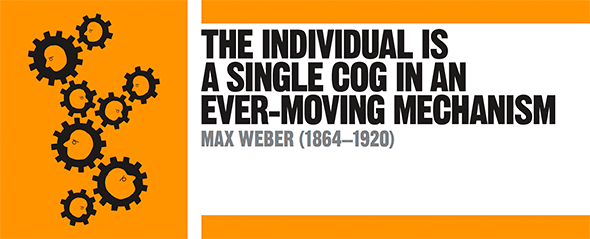
IN CONTEXT
Liberalism
Society
1705 Dutch philosopher Bernard Mandeville writes The Fable of the Bees, demonstrating collective institutions arising from individual behavior.
1884 The final volume of Marx’s Capital is published, though it is unfinished.
1937 American sociologist Talcott Parsons publishes The Structure of Social Action, introducing Weber’s work to a new international audience.
1976 Capitalism and Social Theory by British sociologist Anthony Giddens criticizes Weber’s sociology, arguing instead for the primacy of structures in social action.
Capitalism’s rise in the 19th century prompted new ways to think about the world. Relations between people were transformed, with traditional ways of life torn up. Scientific and technical knowledge appeared to be advancing relentlessly, and society was seen as an object that could be studied and understood. Max Weber provided a new approach to the study of society—in the new discipline of “sociology.” His incomplete work Economy and Society is an attempt to describe the functioning of society, as well as a method by which such study can be taken further. One of Weber’s methods of study was to use abstract notions such as “ideal-types.” Like a caricature of a person, an ideal-type exaggerated key features and reduced the less important ones—but to draw out the underlying truth, rather than to amuse. This approach was key to Weber’s method, and allowed him to understand complex parts of society via a simplified version. The role of the sociologist was to construct and analyze ideal-types based on the observation of reality. This stood in contrast to Karl Marx and earlier writers on social issues, who attempted to deduce the operations of society based on its internal logic, rather than through direct observation.

"For sociological purposes, there is no such thing as a collective personality which ‘acts.’"
Max Weber
Collective understandings
Society, Weber argued, could only be understood on the basis of its constituent parts—in the first instance, individuals. These individuals operated collectively in ways that were complex, but could be understood by the sociologist. Individuals possessed a capacity to act, and their actions would be informed by their view of the world. These views would emerge as collective understandings. Religion and political systems such as capitalism are examples of these understandings. Weber, in his earlier work The Protestant Ethic and the Spirit of Capitalism, claimed that it was the new “spirit” of individualist Protestantism that paved the way for capital accumulation and the creation of a market society. Economy and Society develops this idea, distinguishing between types of religious belief, and analyzing the ways in which individuals may perform social action using a wide variety of belief structures.

Fire ants live in a complex community where the individual’s role is key to the success of the nest. In a similar way, Weber saw the actions of individuals as part of a larger human society.
Restraints to action
Once society’s collective structures are in place, Weber notes, they may act not as enablers, expanding human freedom, but as constraints. This is why Weber speaks of people as “cogs” in a “machine.” The structures people create also restrain their actions, producing further results: Protestants were instructed to work, but also to avoid consuming, and their savings created capitalism.
MAX WEBER

Max Weber was born in Erfurt, Germany, and initially studied law at the University of Heidelberg. Working in a time before the discipline of sociology existed, Weber’s work covered legal theory, history, and economics. He eventually became an economics professor at Freiburg University. Politically engaged from early in his career, Weber made his name as a thinker in social policy, writing on Polish immigration in the 1890s and joining one of Germany’s movements for social reform, the Evangelical Social Congress. After WWI, he cofounded the liberal German Democratic Party.
A tempestuous relationship with his father ended on his father’s death in 1897. Weber had a nervous breakdown, and never fully recovered. He was unable to hold a permanent teaching post again, and suffered from insomnia and bouts of depression.
Key works
1905 The Protestant Ethic and the Spirit of Capitalism
1922 Economy and Society
1927 General Economic History
See also: Mikhail Bakunin • Karl Marx • Georges Sorel • Beatrice Webb
